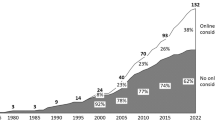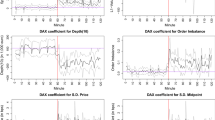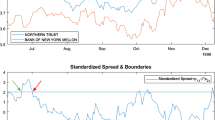Abstract
Consider a trader who exchanges one dollar into yen and assume that the exchange rate fluctuates within the interval [m,M]. The game ends without advance notice, then the trader is forced to exchange all the remaining dollars at the minimum rate m. El-Yaniv et al. presented the optimal worst-case threat-based strategy for this game (El-Yaniv et al. 2001). In this paper, under the assumption that the distribution of the maximum exchange rate is known, we provide average-case analyses using all the reasonable optimization measures and derive different optimal strategies for each of them. Remarkable differences in behavior are as follows: Unlike other strategies, the average-case threat-based strategy that minimizes E[OPT/ALG] exchanges little by little. The maximization of E[ALG/OPT] and the minimization of E[OPT]/E[ALG] lead to similar strategies in that both exchange all at once. However, their timing is different. We also prove minimax theorems with respect to each objective function.
Similar content being viewed by others
References
al-Binali S (1999) A risk-reward framework for the competitive analysis of financial games. Algorithmica 25(1):99–115
Becchetti L (2004) Modeling locality: A probabilistic analysis of LRU and FWF. In: Proc ESA’04, pp 98–109
Becchetti L, Leonardi S, Marchetti-Spaccamela A, Schfer G, Vredeveld T (2006) Average-case and smoothed competitive analysis of the multilevel feedback algorithm. Math Oper Res 31(1):85–108
Borodin A, El-Yaniv R (1998) Online computation and competitive analysis. Cambridge University Press, Cambridge
Chen G, Kao M, Lyuu Y, Wong H (2001) Optimal buy-and-hold strategies for financial markets with bounded daily returns. SIAM J Comput 31(2):447–459
Dempster MAH, Lenstra JK, Kan AHGR (eds) (1982) Deterministic and stochastic scheduling. Reidel, Dordrecht
El-Yaniv R, Fiat A, Karp RM, Turpin G (1992) Competitive analysis of financial games. In: Proc FOCS’92, pp 327–333
El-Yaniv R, Fiat A, Karp RM, Turpin G (2001) Optimal search and one-way trading online algorithms. Algorithmica 30(1):101–139
Embrechts P, Klüppelberg C, Mikosch T (1997) Modelling extremal events: for insurance and finance. Springer, London
Fiat A, Woeginger GJ (1998) Online algorithms: the state of the art. Springer, London
Fujiwara H, Iwama K (2005) Average-case competitive analyses for ski-rental problems. Algorithmica 42(1):95–107
Garg N, Gupta A, Leonardi S, Sankowski P (2008) Stochastic analyses for online combinatorial optimization problems. In: Proc SODA’08, pp 942–951
Gertzbakh IB (1989) Statistical reliability theory. Marcel Dekker, New York
Iwama K, Yonezawa K (1999) Using generalized forecasts for online currency conversion. In: Proc COCOON’99, pp 409–421
Koutsoupias E, Papadimitriou C (1994) Beyond competitive analysis. In: Proc FOCS’94, pp 394–400
Lorenz J, Panagiotou K, Steger A (2007) Optimal algorithms for k-search with application in option pricing. In: Proc ESA’07, pp 275–286
Luenberger DG (1969) Optimization by vector space methods. Wiley, New York
Megow N, Uetz M, Vredeveld T (2006) Models and algorithms for stochastic online scheduling. Math Oper Res 31(3):513–525
Motwani R, Raghavan P (1995) Randomized algorithms. Cambridge University Press, Cambridge
Naaman N, Rom R (2008) Average case analysis of bounded space bin packing algorithms. Algorithmica 50(1):72–97
Øksendal B (1995) Stochastic differential equations: an introduction with applications, 4th edn. Springer, Berlin
Panagiotou K, Souza A (2006) On adequate performance measures for paging. In: Proc STOC’06, pp 487–496
Royden HL (1988) Real analysis, 3rd edn. Prentice Hall, New York
Scharbrodt M, Schickinger T, Steger A (2006) A new average case analysis for completion time scheduling. J ACM 53(1):121–146
Shor PW (1986) The average-case analysis of some on-line algorithms for bin packing. Combinatorica 6(2):179–200
Sleator DD, Tarjan RE (1985) Amortized efficiency of list update and paging rules. Commun ACM 28(2):202–208
Author information
Authors and Affiliations
Corresponding author
Additional information
This work was partially supported by KAKENHI (16092216, 19700015, and 19740059).
Rights and permissions
About this article
Cite this article
Fujiwara, H., Iwama, K. & Sekiguchi, Y. Average-case competitive analyses for one-way trading. J Comb Optim 21, 83–107 (2011). https://doi.org/10.1007/s10878-009-9239-4
Published:
Issue Date:
DOI: https://doi.org/10.1007/s10878-009-9239-4




